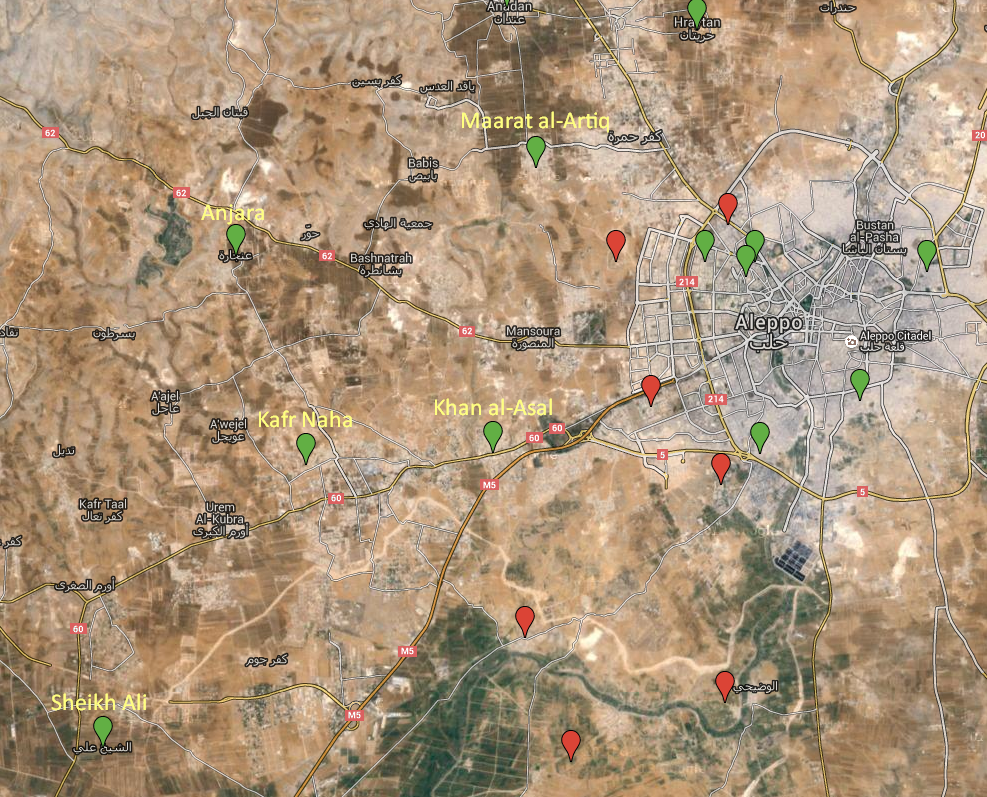Live Updates: Civilians have reportedly been decimated by Russian airstrikes in Idlib and Aleppo provinces, far away from ISIS and, in some cases, far away from the fighting.
The previous post in our Putin in Syria column can be found here.
On December 18, Interfax reported that Rogozin had said the delivery would take place “in the near future.”
On December 30, Rogozin was quoted in an interview with Rossiya-24 TV:
“The deliveries of the S-300 system is determined by a contract. It was signed last year. The deliveries will begin as soon as the funds are received. They have already been deposited on the accounts of the relevant Russian organizations, and the contract is now in the stage of realization.”
That means that since he is now saying the delivery would take “as soon as the funds are received,” when he said the deliver was “underway” nearly two weeks ago, he was getting ahead of events.
“The Iranians asked to deliver the S-300s to them. I calculate that the deliveries will begin at the end of 2016. We already received the advance. I think there further cooperation including in the civilian sphere will be expanded.”
Kommersant said that Russia will send four S-330 PMU-2 divisions to Iran that had been originally intended to go to Syria, but which were not transferred to Syria at Israel’s behest. That suggests that some deliveries could be made without waiting for the systems to be manufactured.
Radar towers which may belong to either an S-300 or S-400 system have already been documented at the Russian base in Latakia, Syria:
relations which, while not directly tied to the S-300s, is relevant: a
major loan that Russia is supposed to grant Iran. The amount was
reported December 22 as $5 billion by the Kremlin propaganda outlet Sputnik International and
it was “likely” that the first installment “can be agreed upon in the
first quarter of next year,” i.e. 2016, however it has not been
finalized.
— Catherine A. Fitzpatrick
At least eight children are reported to have been killed after Russian jets carried out several air strikes on the village of Anjara, west of Aleppo. A primary school was hit.
The Syrian Local Coordination Committees (LCC) report that 17 people were killed in Anjara, with another three dead in Sheikh Ali, around 15 kilometres to the south.
To the east of Anjara, the LCC reports “more than 30 air strikes” around Khan al-Asal and Kafr Naha, as well as two on the town of Maarat al-Artiq.

The LCC posted photographs of the aftermath:


This video from the Shaam News Network shows the school building after the attack. According to the description, three schools were hit today:
This video claims a higher figure of 35 dead overall in Anjara:
In our newest podcast, Boston College Professor Matt Sienkiewicz is joined by The Interpreter’s managing editor James Miller and journalist David Patrikarakos to discuss the Iran nuclear deal, Russian neo-Eurasianism, North Korea, and the Russia’s role in the Middle East.
Listen below or click here to open the podcast in a new tab.
Additional Reading:
– Nuclear Iran: The Birth of an Atomic State
– How can we avoid nuclear catastrophe? On North Korea’s recent nuclear test
– What’s The Goal Of The Kremlin’s Middle East Gamble?
Click here to hear our previous podcasts. You now also have the option to subscribe to our RSS feed and to follow our podcast on iTunes.
— James Miller
Two commanders for the Iran-backed Shia terrorist group Hezbollah have told The Daily Beast that they are receiving weapons directly from the Russian military, “with no strings attached.”
The Daily Beast met the commanders on separate occasions at the end of December and the beginning of this year in Dahiya, a majority Shia working-class southern suburb of Beirut. They declined to use their real names because they are not authorized to speak to the media, but both say Hezbollah is directly receiving long-range tactical missiles, laser guided rockets, and anti-tank weapons from Russia.
“We are strategic allies in the Middle East right now—the Russians are our allies and give us weapons,” said one of the Hezbollah officers who chose to call himself Commander Bakr. He is in charge of five units in Syria, around 200 troops. (He chuckled when he said his nom de guerre, mocking Abu Bakr al-Baghdadi, the self-appointed “caliph” of the so-called Islamic State.)
As someone who has lead units fighting from Latakia to Idlib province, around Damascus, and in the Qalamon Mountains that border Lebanon, Commander Bakr says that the Russian air strikes have changed the course of the ground war, where Hezbollah, supported by Iran, has taken the lead.

Russia Is Arming Hezbollah, Say Two of the Group's Field Commanders
BEIRUT – Lebanese Hezbollah field commanders with troops fighting in Syria tell The Daily Beast they are receiving heavy weapons directly from Russia with no strings attached. The commanders say there is a relationship of complete coordination between the Assad regime in Damascus, Iran, Hezbollah and Russia.
Not only have Russian airstrikes devastated civilians and international air workers, they have also hit rebels that have been trained and armed by The United States. Those rebel groups have also had to fight Syrian ground forces, Hezbollah commandos, Iranian Revolutionary Guard Corps special forces, and Shiite militias from Iraq. If this news is confirmed, it’s proof that Russia is coordinating and directly supplying this coalition, and not just the Assad regime.
Furthermore, in the last several months Israel has conducted airstrikes against Hezbollah commanders, as well as rocket and weapons depots which they say are an imminent threat to the lives of Israeli citizens.
— James Miller